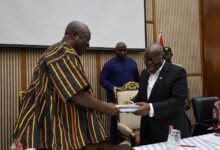Forestry C’ssion to take delivery of weapons

The Forestry Commission (FC) would from February next year, take delivery of automatic weapons for its Wildlife Division’s taskforce for the protection of the forest resources in the country, the Chief Executive of the Commission, Mr Kwadwo Owusu Afriyie has disclosed.
He said the commission had gone through the legal procedures and secured clearance from the security agencies and the Public Procurement Authority (PPA) for the importation of the weapons.
These were contained in a speech read on his behalf by the Deputy Chief Executive, Mr John Allotey, at the opening of a five-day training of trainers workshop on the implementation of the Convention on International Trade in Endangered Species (CITES) of Wildlife and Flora in Accra yesterday.
He stated that 1,000 taskforce members of the commission have been trained by the Ghana Armed Forces (GAF) at the Asutsuare Military Training Centre on weapon handling and dismantling, combating, endurance, communication among others.
According to him, the commission would undertake more of such training for the taskforce for proper handling of the weapons which was an upgrade over the current ones in use to ensure these did not get into the wrong hands.
Mr Owusu Afriyie said the commission had signed a Memorandum of Understanding (MoU) with the GAF to give the best of training to the taskforce.
The workshop is being organised by the Wildlife Division of the Forestry Commission which is the management authority of CITES in Ghana in collaboration with the United States Administration for Ocean and Atmospheric Affairs (NOAA), the West African Biodiversity and Climate Change programme (WABiCC) of the United States Agency for International Development (USAID) and Born Free Agency in the US.
The workshop was to develop the capacity of the trainers comprising officers from the Customs Division of the Ghana Revenue Authority (GRA), Forestry Commission and other participants from Cape Verde and Guinea Bissau to replicate the training and form a national team specialising in CITES training.
According to the Chief Executive of the Forestry Commission, since 1970 the Forest and Wildlife sector had been subjected to various impacts that threatened the sustainability of timber resources and wildlife species.
He said habitat decline has been the primary cause of endangerment of most species adding that uncontrolled wildlife trade has become the major cause of decline for some animals and plant species.
Mr Afriyie said that West Africa was increasingly becoming a transit point for wildlife products coming from other African countries; these illegal trade species included chimpanzees, grey parrots, pangolins and rosewood among others.
He stated that the illegal wildlife trade globally has been estimated at $ 10 billion dollars per year, and attributed it to inadequate law enforcement and weak border controls which has made it less risky for the perpetrators.
BY SETH ADU AGYEI








